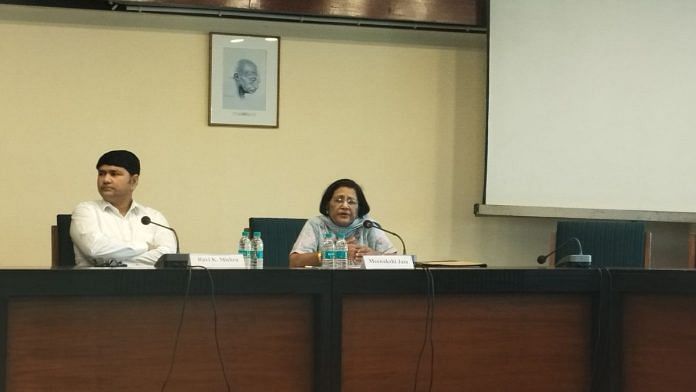In the wider debate on decolonisation, one system hasn’t yet been discussed in much detail—the judiciary. Its colonial past has often been overlooked.
How did India end up with the judicial system of today? The answer to this lies in the British decision to translate what East India Company officials called ‘legal digests’ of ‘Hindu people’. Meenakshi Jain, a political historian, scholar and author, delved into the origins of the country’s judicial systems in a public seminar at the Prime Minister’s Museum and Library, Delhi, on 9 May.
The British began with Manu’s Dharmashastras. The reason behind this decision was to provide English versions of these scriptures to British judges to enact indigenous laws. Even St Paul’s Cathedral in the heart of London houses a statue of Sir William Jones (1746-1794)— the famous orientalist and judge of the Supreme Court at Calcutta — with his arm resting on a copy of the Manusmriti.
The irony is that the East India Company had no interest in the established legal systems — not at first at least.
“The decisive development takes place in 1765. That is when the Mughal emperor [Shah Alam II] gave the East India Company the Diwani rights of Bengal, Bihar and Odisha. Diwani right means that that company is now responsible for the judicial and revenue administration of these areas,” said Jain.
However, the British misunderstood and distorted India’s diverse judicial practices, leading to long-lasting consequences. A conciliatory form of justice that acknowledged shades of grey was transformed into an adversarial system.
“And because of these translations, that evolutionary fluidity of pre-colonial laws and customs was ossified. So, they made rigid a tradition and practice that was freely flowing, evolving,” said Jain.
A tale of misinterpretation
The attempt to translate Indian works is a tale of misunderstanding and misinterpretation of people and their customs. And it began with Manu’s Dharmashastra—with treatises on ancient Hindu religious laws, literature and codes that govern life.
“This is where we can say that the commencement of a perilous journey begins,” said Jain
The East India Company aimed to establish a clear-cut, adversarial legal system, which clashed with the traditional Panchayat system. The ancient text was reduced to a guidebook, an instruction manual that did not reflect its original intent. This was made worse by their lack of understanding of cultural and social contexts.
“The complexity and regional variety of indigenous laws was distorted, truncated, and misrepresented,” said Jain. As a result, people were arrested without due cause, disputes took longer to resolve, and backlogs delayed justice.
It resulted in policies that sowed the seeds for the North-South divide.
Also read: India losing its status as a conservation leader. Our laws aren’t stopping march to decline
Beginning of a lasting rift
In 1790, three leading civil service officials in the Madras Presidency—FW Ellis, AC Bernal and JH Wilson—refused to follow the northern school of legal administration. Among the three, Ellis was the most vocal about his disagreement.
He had observed how, in the South, customary laws – primarily those concerned with caste, general customs, religious acts and religious ceremonies – were given more priority and importance compared to textual authority. Ellis, according to Jain, wanted to continue this practice.
In his lectures, Ellis describes an oral tradition of passing down rulings and customary laws in the judicial systems of the South. These methods of passing down principles of the panchayat were usually not instructed by texts like the Dharmashastras. Due to his understanding of the local practices, Ellis wrote the first essays that opposed the decision made by company officials in the north.
This created a dichotomy in how judicial systems evolved in different parts of India.
“This division between the North and South, it gets really aggravated in the early British period, because of the texts. They wanted to impose what they regarded as the laws enunciated in the Dharmashastras into the South,” said Jain.
But for the most part, Indians were wary of the new systems being put into place. Slow judicial processes further exacerbated this lack of trust.
During the audience interaction, Jain made a reference to a written account by Sir Charles Metcalfe, known as the ‘Liberator of the Indian Press’, who did away with all restrictions on local media through The Press Act of 1835.
According to Jain, Metcalfe wrote in one account that British courts were so prone to manipulation that only those in the wrong would seek ‘justice’ there.
“If he is right, he would never come to the British court,” she said.
(Edited by Zoya Bhatti)




the british like other european countries not only divided people, but imposed their religion in their occupied territories and it was the locals who fell prey to their money and luxuries (like mir jafar of bengal) that the occupiers penetrated even into the religion and religious practices. that is the reason long b4 even gandhi was born, the muslim mufis or heads issued fatwa of jihad against the british and their rules… especially by one Maulana Fazle Haq Khairabadi.. who was sent to prrison in andamans due to this… a point to be noted here is never the muslim heads issued any fatwa against hindus who were already living in india… as hindus were no where comparable to the british atrocities and injustice rules.. major problem was we indians and our then rules supported british who came to india only for trade, to study the chinese trades,… but our rules and people were so down to earth as today the general public is that the british exploited our hospitality for their own benefit… they not only robbed our resources, but religion too with britishization…. same thing they did in every other occupied territories. and today these same occupies pose as if they’re the sole caretakers of humanity